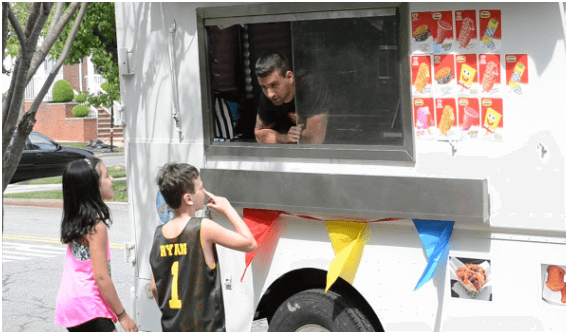social experiment, designed to gauge the level of awareness children have about the dangers of interacting with strangers, involved a plain white van with a friendly-looking man offering free ice cream.
A recent social experiment conducted in Sharjah has revealed alarming results: 97% of children tested were willing to enter a stranger’s van in exchange for free ice cream. This finding underscores the urgent need for enhanced child safety education and awareness among both parents and children.
The van was parked in areas frequented by families, such as parks and playgrounds. Over the course of the experiment, nearly all the children approached accepted the offer and entered the van, despite not knowing the person inside.
These results have sent shockwaves through the community, highlighting the vulnerability of children and the need for stronger measures to protect them. The social experiment organizers emphasized that the purpose was not to blame parents but to raise awareness about a critical issue that requires immediate attention.
Parents were informed about the experiment and its results, leading to a range of reactions from shock and disbelief to a renewed commitment to educating their children about the dangers of interacting with strangers in social experiment . Many parents admitted that they had assumed their children understood the “stranger danger” concept but realized that more explicit conversations and education were necessary.
Experts in child psychology and safety have weighed in on the findings, offering insights and recommendations. Dr. Aisha Al-Hosani, a child psychologist, noted that children are naturally trusting and can easily be lured by seemingly harmless offers. She stressed the importance of parents having regular and age-appropriate conversations with their children about safety. “It’s crucial to teach children to recognize and avoid potentially dangerous situations,” Dr. Al-Hosani said. “Role-playing different scenarios with your children can help them understand how to respond if approached by a stranger.”
In response to the experiment’s findings, local authorities and child safety organizations are ramping up efforts to address this issue. The Sharjah Child Safety Department announced plans to launch an extensive awareness campaign targeting both children and parents. The campaign will include workshops in schools, distribution of educational materials, and public service announcements to reinforce the message of stranger danger.
Additionally, schools in Sharjah are expected to incorporate more comprehensive safety education into their curricula. Teachers will be trained to discuss these topics with students and reinforce the lessons regularly. The goal is to create a culture of safety awareness that permeates all aspects of children’s lives, both at home and in school.
The experiment has also sparked discussions on social media, with many parents sharing their own strategies for teaching their children about safety. Some have suggested using child-friendly apps and videos that explain the concept of stranger danger in an engaging way. Others have highlighted the importance of community vigilance and encouraging children to always stay with a trusted adult in public places.
Law enforcement agencies in Sharjah have also taken note of the experiment’s results. They have pledged to increase patrols in areas where children are known to gather and to work closely with community organizations to enhance safety measures. Police officers will also participate in school visits to educate children about the importance of staying safe and recognizing potentially dangerous situations.
While the results of the social experiment are indeed alarming, they have served as a wake-up call for the community. The collective response from parents, educators, and authorities demonstrates a commitment to addressing the issue head-on. By working together and ensuring that children are educated about the dangers of interacting with strangers, Sharjah aims to create a safer environment for its youngest residents.
Ultimately, the findings of this social experiment underscore a universal truth: the safety of children is a shared responsibility. Parents, educators, law enforcement, and the community at large must all play a role in ensuring that children are equipped with the knowledge and skills to protect themselves from harm. Through ongoing education, awareness, and vigilance, the community can work towards preventing such alarming scenarios from becoming a reality.
Stay Connected: ”Your Source for the Latest News Updates”





